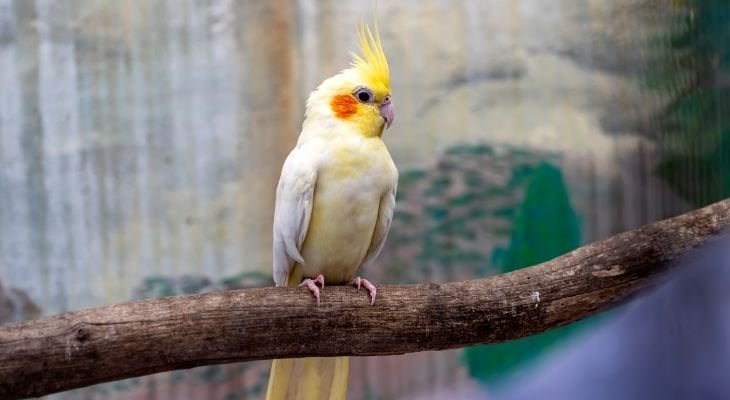
Cockatiels are among the most popular pet birds. Small parrots with a variety of color patterns and a crest, they are attractive as well as friendly and easy to tame. Because of their small size, cockatiel care and taming is easier than some other parrot species. They are capable of mimicking speech, although they can be difficult to understand. However, they are quite good at whistling and can often be taught to whistle tunes.
Choosing a Bird
It is best to choose a hand fed baby or at least a young bird that has been handled regularly. Prices will vary with color and you can expect to pay a bit more from a conscientious breeder, but a well handled young bird is worth any extra cost. Cockatiels are quite widely available at pet stores, but these birds may have an unknown history. As a result, they may be older, not used to being handled, and harder to tame.
Look for a bird that is bright, alert and active. A bird sitting quietly with puffed feathers might be ill and is best avoided. The feathers should be smooth and shiny and lay down flat on the body. The feathers around the vent/cloacae should be clean, dry, and free of fecal matter. The scales on the feet should be smooth, the nails in good condition, the beak should be smooth and well-shaped, and the nostrils should be clear and clean.
Housing Cockatiels
Cockatiels are active and playful and should have a large cage. Opinions on the minimum size vary, but a good rule of thumb is at least 20 inches by 20 inches wide, and 26 inches tall as a bare minimum. The spacing on the cage bars should be no more than 3/4 inches (any larger is a safety hazard). Horizontal cage bars offer the best opportunity for climbing and exercise. There should be space to place at least a couple of perches at different levels with enough space to comfortably move between them. Many cockatiel cages come with a removable bottom tray for easy cleaning.
Feeding Cockatiels
Variety is the key to a healthy diet. Seeds can be a nutritious part of the diet, but are high in fat so should only make up a part of the diet (some experts recommend no more than about 30% of the diet). Pelleted diets are often a good choice for birds as they are nutritionally balanced and birds can't pick out their favorite seeds and leave the rest. However, with both seeds and pellets a wide variety of other foods should complement the diet. A variety of fresh vegetables and fruit should be offered, although persistence might be needed before your bird will try new foods (particularly if they are accustomed to an all-seed diet). Proteins such as hard boiled egg, legumes, and cooked meats can be offered in moderation. Sprouted seeds are also an excellent way to add variety to your bird's diet. Avoid avocado.
Cockatiel Information:
- Life span: cockatiels regularly live 15-20 years with proper care (up to 30 reported).
- Colors: wild type is grey body with a yellow face and crest and orange cheek patch. The colors on the face are brighter and more vivid in the male, and the female has bars on the underside of the tail feathers. Color variations include albino, lutino, pied, pearl, cinnamon, and silver. The differences between males and females vary in the different color variations and can sometimes be hard to distinguish, especially in young birds.
- Reputation as a gentle and docile bird; often like to be petted and held.
- Males are thought to be better at mimicking speech and whistles.
- Pairs of birds make good company for each other, but usually will not bond as well with their owners or mimic speech or sounds. A single bird is fine, as long as you spend a significant amount of time interacting with the cockatiel on a daily basis.
- Have a powder on their feathers (used in grooming) that may leave a powdery coating on cages and accessories.
- Playful and active, and while they vocalize and whistle they are not as loud as some other parrots.
